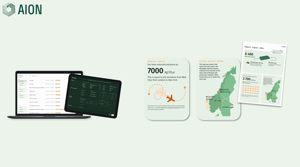
PROVEN IMPACT
WHY IS PROVEN IMPACT IMPORTANT IN WHAT WE DO?
Scope 3 emissions, those indirect emissions from your supply chain are among the most challenging to measure accurately and reduce. However, with growing pressure from investors and regulators, addressing them is no longer optional.
AION offers solutions that make it easier for your company to report and reduce your Greenhouse Gas (GHG) emissions. Products made from recycled materials and those made for circular application, help minimize the environmental impact. That's why AION only work with trusted suppliers, and we follow the development and manufacturing process closely to ensure compliance and correct reporting.
EU NEW Green deal results in massive increase in new legislation
The European Green Deal is an ambitious plan proposed by the European Commission to transform the European Union (EU) into a more sustainable and climate-neutral economy. It aims to make Europe the world's first climate-neutral continent by 2050, with significant reductions in greenhouse gas emissions and increased efforts to protect biodiversity and natural resources.
The Green Deal encompasses various policy initiatives and measures across different industries, to achieve these goals. Key components of the Green Deal include increasing renewable energy production, improving energy efficiency, promoting sustainable agriculture and forestry practices, and fostering the circular economy.

TRENDS AND REGULATIONS FOR PLASTICS
In order to ensure progress and reach emissions goals, new regulations and legislations have emerged within different industries through the EU following the New Green Deal.
Set targets for reuse of several products categories over single-use and low lifetime options, minimum recycled content in products and packaging, ban on single-use plastics, plastic tax and (SUP’s, PPWR, CSRD) more comprehensive EPR regulations are just some of the areas touching upon AION’s customers.
New agreements to reduce, reuse and recycle, increase safety and boost the circular economy are hitting the plastic industry. Aiming for less packaging and restricting certain packaging formats and non-circular design.
Some new legislations have set concrete packaging reduction targets (5% by 2030, 10% by 2035 and 15% by 2040) and requires EU countries to reduce plastic packaging waste. Several types of single use plastic packaging will further be banned, and other packaging categories will need to meet a minimum of recycled content to avoid taxation or other fees. It is to be expected that following these new regulations will increase costs and time for companies to remain compliant.
Further AION follows the increased demand and need for full value-chain traceability and emergence of Digital product passports (DPP) within several product categories, expected to apply for plastic products by 2030.
AION’s solution to remain compliant and navigating in the regulatory landscape:
- Value-Chain Traceability
- Accurate Impact Reports
- Avoid Greenwashing
- Regulatory Insight
DOCUMENTED IMPACT REPORTING
AION offers comprehensive value-chain traceability and documented impact reporting. We always register and capture information on material source and material use in both the recycling and manufacturing. As well as logging all return of circular products if they make it back to us for end-of-life recycling and re-manufacturing. Overall ensuring transparency and accountability throughout the supply chain. Developed with and for the

ANALYSING PLASTIC DATA
By collecting and analyzing data on plastic material origin, composition, mechanical recycling, plastic manufacturing processes, we help companies generate accurate impact reports that demonstrate their commitment to sustainability and their actual environmental impact.

PROVIDING VERIFIABLE DATA
With AION, companies can avoid greenwashing by providing verifiable data and evidence of their sustainability efforts, building trust and credibility with consumers and stakeholders.

STAY AHEAD OF REGULATORY REQUIREMENTS

WHY DO WE HAVE TO PROVE OUR SOLUTION?
At AION, we recognize the critical importance of proving the impact of sustainability initiatives in today's complex business landscape. From combating greenwashing to navigating intricate value chains and complying with regulations, companies face numerous challenges in demonstrating their commitment to environmental responsibility.
PROVE YOUR IMPACT
FREQUENTLY ASKED QUESTIONS
AION provides impact reports detailing various metrics. These reports include information on the chain of custody of materials, CO2 emissions saved, virgin resources avoided, and waste volumes diverted.
They are presented in a visually appealing format, offering clear insights into the environmental impact of your operations.
If you're in need of specific data collected it's important to let us know early on in projects.
Impact reports from AION are normally delivered annually, providing you with an update on the sustainability performance of your supply chain. This information helps track progress, make informed decisions, and communicate your sustainability efforts to stakeholders.
AION can also accommodate more frequent reporting if needed.

